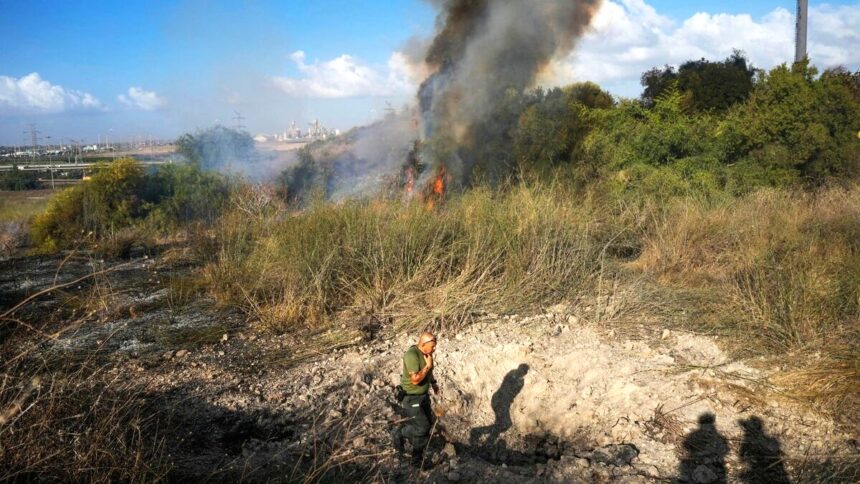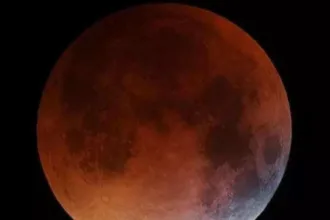Overview of the Attack
On Sunday, central Israel was struck by a long-range missile fired by the Houthi Missile rebels, marking the first time the Yemen-based group has reached deep into Israeli territory. The missile, reportedly a new hypersonic ballistic type, traveled approximately 2,040 kilometers (1270 miles) in just 11.5 minutes. It impacted around 6:35 a.m. local time (0335 GMT), leading to a significant response from Israeli authorities.
Details of the Incident
At first, it was thought that the missile had landed in a clear space without causing any damage. However, further assessments by the Israeli Defense Forces (IDF) indicated that the missile had likely fragmented in mid-air. Debris from the missile and fragments from Israel’s defense interceptors were scattered across fields and near a railway station. Although there were no reported injuries from the explosion itself, the activation of air raid sirens caused panic, leading to nine injuries as people sought shelter.
🚨 Central Israel has been struck by a ballistic missile fired from Yemen
The Yemeni ballistic missile traveled 2,000 kilometers and took 15 minutes to reach its target 🎯
pic.twitter.com/Nh6epZmOx6
— Sir Chilliebean (@Chilliebeanz) September 15, 2024Significance of the Attack
This attack is unprecedented in its range and impact. The Houthi Missile, who have historically launched attacks from Yemen, managed to penetrate deep into Israeli airspace for the first time. This escalation represents a new phase in the conflict, reflecting the Houthis’ increasing military capabilities and their willingness to strike further afield in response to perceived injustices.
Background and Context
The Houthi Missile, an Islamist militant group supported by Iran, have escalated their attacks on Israel in recent months. This new missile attack follows a July incident where a Houthi drone struck Tel Aviv, resulting in one Israeli death and several injuries. In retaliation, Israel conducted air strikes on Houthi targets near the port city of Hodeidah in Yemen, causing significant casualties among the Yemeni population.
The Houthis have justified their attacks as acts of solidarity with the Palestinians, particularly in response to Israeli actions in Gaza. This latest missile strike was likely intended as a message to Israel and a demonstration of their expanded military capabilities.

Israeli Prime Minister’s Response
Israeli Prime Minister Benjamin Netanyahu responded firmly to the attack, asserting that the Houthis would face a “heavy price” for their actions. Netanyahu referenced Israel’s previous retaliatory air strike on Hodeidah, suggesting that the Houthis should expect further consequences for their aggression. His statement underscores Israel’s resolve to defend itself against attacks and deter future strikes.
Additional Incidents and Regional Tensions
On the same day as the Houthi missile strike, the IDF reported that 40 projectiles were fired from Lebanon towards Israeli territory. These projectiles were either intercepted by Israel’s defense systems or fell in open areas, with no injuries reported from these incidents. This highlights a broader trend of increasing regional tension and cross-border attacks involving multiple actors.
The Houthis have indicated that this missile strike is just the beginning and have promised more attacks, particularly as the anniversary of the Hamas assault on Israel on October 7 approaches. This implies that in the upcoming months, the war may intensify much further.
Implications for Regional Security
The recent missile strike by the Houthis underscores the growing complexity of the regional conflict. The involvement of the Houthis, backed by Iran, adds a new layer to the already tense relations between Israel and Iran. The ability of the Houthis to strike central Israel may prompt a reassessment of security measures in the region and potentially draw in additional international actors.
The increasing range and frequency of Houthi attacks could destabilize the region further, leading to more significant international implications. The global community will be closely monitoring the situation to gauge the potential for further escalation and the impact on regional stability.
The Houthi missile attack on central Israel represents a significant escalation in the ongoing conflict between the Yemen-based militia group and Israel. While no direct injuries were reported from the attack, the event highlights the growing reach and capability of the Houthis’ military arsenal. As tensions continue to rise, both regional and international stakeholders will be watching closely for further developments and responses from the involved parties.
Read More : Venezuelan President Maduro Accuses US CIA of Assassination Plot; US Denies Involvement Amid Recent Arrests






